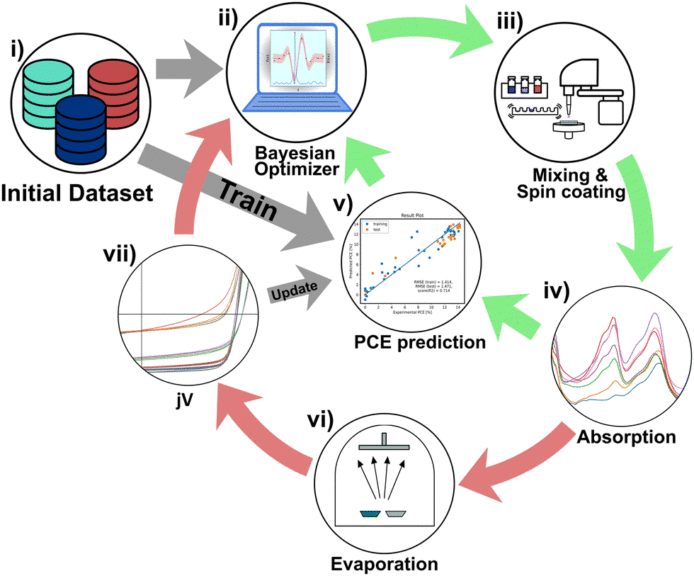Optimizing solution-processed organic solar cells (OSCs) is challenging due to the multidimensional parameter space involved. Traditional one-variable-at-a-time (OVAT) methods are slow and often suboptimal.
To address this, researchers have implemented an autonomous optimization strategy using artificial intelligence (AI) within the LineOne platform. A Bayesian Optimizer (BO) guides the autonomous exploration of the parameter space for OSCs.
This system fabricates and characterizes complete OSC devices efficiently. A Gaussian Progress Regression (GPR) model predicts device efficiency from proxy measurements like spectral data. This approach reduces the number of tests required to find optimal parameters.
In an experiment, the researchers optimized a ternary OSC system (PM6:Y12:PC70BM) within a four-dimensional parameter space, achieving precise results with only 40 tests compared to the traditional Edisonian approach, which would have required over 1000.
Christoph Brabec and Larry Lüer, FAU Solar members, contributed to this research. This advancement has significant implications for improving the efficiency and cost-effectiveness of solar cells.
The authors acknowledge the generous support of the STAEDTLER Foundation, which funded this work as part of the project Accelerated Innovation for a Sustainable Solar Energy Future.
Link to publication in Energy & Envirnonmental Science

Optimizing solution-processed organic solar cells (OSCs) is challenging due to the multidimensional parameter space involved. Traditional one-variable-at-a-time (OVAT) methods are slow and often suboptimal.
To address this, researchers have implemented an autonomous optimization strategy using artificial intelligence (AI) within the LineOne platform. A Bayesian Optimizer (BO) guides the autonomous exploration of the parameter space for OSCs.
This system fabricates and characterizes complete OSC devices efficiently. A Gaussian Progress Regression (GPR) model predicts device efficiency from proxy measurements like spectral data. This approach reduces the number of tests required to find optimal parameters.
In an experiment, the researchers optimized a ternary OSC system (PM6:Y12:PC70BM) within a four-dimensional parameter space, achieving precise results with only 40 tests compared to the traditional Edisonian approach, which would have required over 1000.
Christoph Brabec and Larry Lüer, FAU Solar members, contributed to this research. This advancement has significant implications for improving the efficiency and cost-effectiveness of solar cells.
The authors acknowledge the generous support of the STAEDTLER Foundation, which funded this work as part of the project Accelerated Innovation for a Sustainable Solar Energy Future.
Link to publication in Energy & Envirnonmental Science